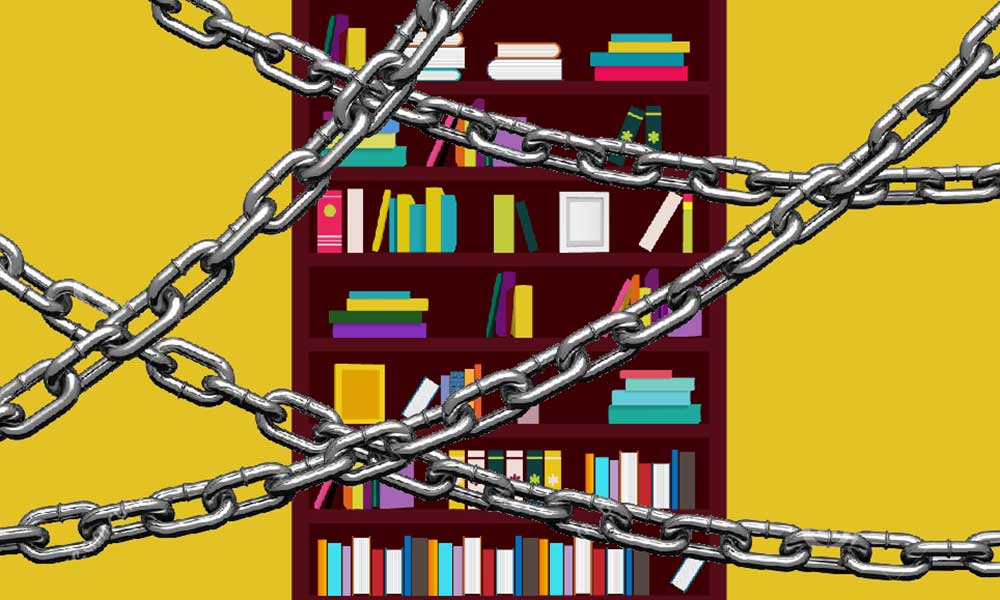Book bans are about both control and terror. They have been on the rise since 2016, and they reached record numbers last year. The censors, a tiny minority of Americans, know their side has lost the culture wars but are nonetheless emboldened by the power they attained in the Trump era. Aided by opportunistic Republicans in statehouses and governors’ mansions, they are targeting LGBTQ+ and nonwhite children in an unconstitutional, ham-fisted effort to assert their dominance.
The book banners claim to represent a swath of ordinary, concerned parents, but a Washington Post investigation found that, of more than 1,000 challenges made to books in public schools across the country last year, the majority were filed by just 11 people. Most of these submissions, driven by complaints from such far-right operations as Moms for Liberty, targeted books with gay, lesbian, non-binary or transgender characters.
Jews are well aware of the threat of censors. Inquisitors in medieval Europe burned the Talmud and other sacred Jewish texts. The Nazis burned books their propagandists deemed “un-German” or “degenerate”; similar terms are heard in contemporary American rightists’ assaults on LGBTQ+ rights and safety, with a particular venom directed at transgender children. The United States has a long history of crusades against books thought to be subversive because they concerned topics or characters considered un-American, too sexual or, in today’s tiresome parlance, “woke.” Of course, there has often been pushback. In 1939, as fascism was on the march in Europe, the American Library Association adopted its first version of its Library Bill of Rights, noting in the preamble that “many parts of the world point to growing intolerance, suppression of free speech, and censorship affecting the rights of minorities and individuals.”
Yet American book banners have continually tried to flex their muscles, aiming to censor books that challenge their preferred status quo or that they claim make them feel uncomfortable—that is, books that speak the truth about history’s great injustices. In the 1970s, the protests of a small group of parents in Kanawha County, West Virginia, against books by Black authors and about the civil rights movement sparked violent racist threats and bombings. But months after most local residents had put the conflict behind them, the New Right activists then shaping the conservative movement persisted in portraying those few parents as heroic representatives of a silent majority besieged by bureaucrats who, in the words of religious right architect Paul Weyrich, sought “to denigrate their parental authority, to deride the values upon which this country has been built, to mock, sneer, vituperate.”
Jews are well aware of the threat of censors.
The claim that the government was robbing parents of their right to raise their children as they saw fit continued to reverberate on the right. In the 1980s, the late televangelist Pat Robertson helped fund a lawsuit brought by parents who claimed that home economics textbooks promoted secular humanism and undermined the parental authority required by their version of Christianity. By encouraging students to think independently and make their own decisions rather than submit to peer pressure (for instance, when urged by peers to drink or smoke), the plaintiffs claimed, the textbooks undermined God’s word and parents’ authority. Shockingly, they prevailed before a federal trial judge in Alabama, though he was reversed and roundly rebuked by the court of appeals.
More recently, Republican Glenn Youngkin ran his “parental rights” campaign for Virginia governor by fanning the flames of a white mother’s complaint that her son, as a high school senior, found reading Toni Morrison’s Pulitzer Prize-winning novel Beloved “disgusting and gross.” Under the “anti-woke” regime of Florida Governor Ron DeSantis, the Florida Department of Education rejected high school texts about the Holocaust and requested changes to a middle school text that discussed social justice issues in the Hebrew Bible.
These Groundhog Day-esque waves of attempted censorship are a form of backlash, driven by the grievances of white Christian conservatives against long-marginalized groups who have recently achieved rights and freedoms. Book banners present themselves as mighty American heroes, yet so delicate that their sense of superiority could be shaken by reading about racism, slavery or genocide. In their view, the out-groups aren’t fellow humans deprived of rights; they are bullies intent on destroying the “real” America.
Today’s censors may seem to wield outsized power, amplified by the likes of Fox News and social media titan Elon Musk, who delights in the adoration of fascist goons on Twitter. But despite the attention commanded by these huge megaphones, they speak for a small segment of America. Like all authoritarians, they want to make you believe you have already lost. Defenders of freedom and human rights have not yet lost. But we will have to keep up the fight, and stay vigilant.
Sarah Posner is the author of Unholy: How White Christian Nationalists Powered the Trump Presidency, and the Devastating Legacy They Left Behind.
Moment Magazine participates in the Amazon Associates program and earns money from qualifying purchases.


